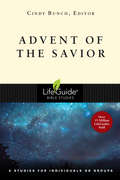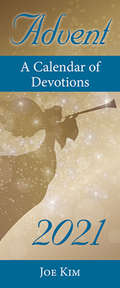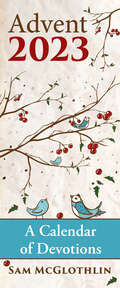- Table View
- List View
Advent Grace
by Daughters of St. PaulIn this daily Advent companion, members of the Daughters of St. Paul share their reflections and lead readers in lectio divina on the Scripture readings for the season. Includes reflections for the Octave of Christmas.
Advent International and Walmart Brazil's Deal
by Victoria Ivashina Ruth Costas Pedro LevindoAdvent International, one of the world's leading private equity firms, must decide whether to acquire Walmart's subsidiary in Brazil or not. Although Walmart Brazil is losing cash at a rapid pace, Advent thinks it has a solid plan to recover the company's finances. However, there are several execution risks associated with the deal and local analysts are skeptical about the possibility of a quick turnaround.
Advent International: Kroton Investment
by Victoria Ivashina Priscilla Zogbi Ruth KostasCase - Finance
Advent for Everyone: A Journey Through Matthew
by N. T. WrightAdvent for Everyone: Mark, Year B provides readers with an inspirational guide through the Advent season, from the first Sunday in Advent through the Saturday after the Fourth Sunday in Advent. Popular biblical scholar and author N. T. Wright provides his own Scripture translation, brief reflection, and a prayer for each day of the season, helping readers understand Advent in the wider context of God's love. Wright's engaging and accessible writing and imagery help us see Advent both in relation to the gospel message and in our own lives today. Each Sunday's text uses the Mark passage from the Revised Common Lectionary, with the rest of the week drawn from other passages in the Gospel and the lectionary. This book is suitable for both individual and group study and reflection.
Advent for Everyone: Luke
by N. T. WrightAdvent for Everyone: Luke provides readers with an inspirational guide through the Advent season, from the first Sunday in Advent through the Saturday after the Fourth Sunday in Advent. Popular biblical scholar and author N. T. Wright provides his own Scripture translation and brief reflection, exploring the Gospel themes of faith, repentance, justice, and celebration. Wright's engaging reflections take you on a journey of spiritual enlightenment, guiding you toward the wonder and joy of Christmas. This book is suitable for both individual and group study and reflection.
Advent for everyone
by Dr N. T. WrightAdvent for Everyone: Matthew provides readers with an inspirational guide through the Advent season, from the First Sunday of Advent through the Saturday after the Fourth Sunday of Advent. Popular biblical scholar and author N. T. Wright provides his own Scripture translation and brief reflection to guide readers through the season toward the wonder and joy of Christmas. This book is suitable for both individual and group study and reflection.
Advent in Narnia: Reflections for the Season
by Heidi Haverkamp"Walking into Advent can be like walking through the wardrobe. " With its enchanting themes of snow and cold, light and darkness, meals and gifts, temptation and sin, forgiveness and hope--and even an appearance by Father Christmas--C. S. Lewis's The Lion, the Witch, and the Wardrobe fits naturally into the Advent season. As the reader seeks a storied king and anticipates the glorious coming of Christmas, these twenty-eight devotions alternate between Scripture and passages from the novel to prompt meditation on Advent themes. Each devotion also includes questions for reflection. The book also provides several resources for churches, including four sessions for small group discussion and ideas for creating a "Narnia Night" for families. Readers will ultimately come to know God better while journeying through Narnia.
Advent in Plain Sight: A Devotion through Ten Objects
by Jill J. DuffieldIn this daily devotional for Advent, Christmas, and Epiphany, Jill J. Duffield draws readers' attention to ten ordinary objects that appear in the biblical narratives of messianic prophesy and incarnation--objects we encounter in our own lives. Through objects such as gates, trees, cloth, light, and water, readers will find new meaning in the biblical account of Jesus' coming. By connecting everyday objects with biblical texts, Advent in Plain Sight prompts readers to see the near kingdom of heaven on earth and ponder what that divine proximity enables and asks them to do and be. Each daily devotional features a Scripture reading, prayer, and reflection, reminding Christians that God still dwells among us, even in the most ordinary places.
Advent of Dying (Sister Mary Helen Mysteries #2)
by Carol Anne O'MarieIn her 70s, Mary Helen is supposedly retired at Mount St. Mary College. When her timid secretary Suzanne Barnes is murdered, however, the grieving nun determines to see justice done. Her friends in the police have no leads; very little is known about the victim, who had appeared out of nowhere, seemingly, to work at the school. Taking her equally daring religious companions on visits to people in Suzanne's apartment building, Mary Helen questions the residents but gets no solid clues.
Advent of Dying (Sister Mary Helen Mysteries)
by Carol Anne O'MarieReaders have come to delight in the murder-solving exploits of septuagenarian Sister Mary Helen and her cohort Sister Eileen, two nuns with a nose for nabbing killers. Publishers Weekly calls the Sister Mary Helen Mysteries "refreshingly different" and a "heady mix of humor and suspense." Once you meet this spry, clever sleuth, you'll want to make a habit of reading her adventures again and again.Timid little Suzanne Barnes was the perfect ecclesiastical secretary: efficient, discreet, self-effacing. So it came as a shock when Suzanne invited Sisters Mary Helen, Eileen and Anne to Ghiradelli Square's Sea Wench Bar to hear her belt out the blues. Sister Mary Helen wondered what secrets lay behind those watery blue eyes. The Sea Wench Suzanne was a revelation: sassy, sexy, dressed to kill. It was her first-and last-performance, punctuated by a silver letter opener in the heart. Who killed the canary? Sister Mary Helen and her faithful band must unearth Suzanne's secrets to solve the murder before all hell breaks loose-again...
Advent with Pope Francis
by Marianne Lorraine Trouvé FSPLet the inspiring words of Pope Francis guide your Advent journey of preparation so that you can fully celebrate the birth of Christ. This daily devotional includes Scripture citations for each day of the season, a selection of the Holy Father's writings, reflection questions, and a prayer. It will be the perfect volume to remind you to slow down and breathe in God's spirit, no matter how busy you find yourself!
Advent: A Calendar of Devotions 2013
by Deborah WestbrookThe season of Advent provides an opportunity for spiritual renewal for followers of Christ. But often what happens is that we get so caught up in the hurry and rush, the hustle and bustle, the frantic pace of the season that we emerge more spiritually exhausted than refreshed, more disillusioned than inspired to face the coming of a new year. We may have tried so hard to enjoy the holiday season, to recapture a sense of wonder and mystery, only to end up asking, "Is that all there is?" The purpose of Advent, A Calendar of Devotions 2013 is to help you focus on the things that truly matter during this busy season, so that you can experience spiritual renewal. Advent, A Calendar of Devotions 2013 is a booklet of daily devotions for the season of Advent (the four weeks before Christmas) that helps you step back from the bustle and stress of the season and prepare your heart and mind to rejoice in God's loving gift, Jesus Christ. Each daily devotion includes a recommended Scripture reading, a Bible verse, an inspiring message, and an uplifting prayer.
Advent: A Calendar of Devotions 2014 (Package of #10)
by James W. MooreAdvent: A Calendar of Devotions 2014 is a booklet of daily devotions for Advent that helps people step back from the bustle and stress of the season and prepare heart and mind to rejoice in God's loving gift, Jesus Christ. Each daily devotion includes a recommended Scripture reading, a Bible verse, an inspiring message, and an uplifting prayers. The season of Advent provides an opportunity for spiritual renewal for followers of Christ. But often what happens is that we get so caught up in the hurry and rush, the hustle and bustle, the frantic pace of the season that we emerge more spiritually exhausted than refreshed. The purpose of Advent: A Calendar of Devotions 2014 is to help the reader focus on the things that truly matter and experience spiritual renewal.
Advent: A Calendar of Devotions 2015 (Package of #10)
by Nell W. MohneyAdvent: A Calendar of Devotions 2015 is a booklet of daily devotions for Advent that helps people step back from the bustle and stress of the season and prepare heart and mind to rejoice in God's loving gift, Jesus Christ. Each daily devotion includes a recommended Scripture reading, a Bible verse, an inspiring message, and an uplifting prayer. When ordering your for a congregation, secure additional copies for nursing home residents, those in prisons, and other groups in need of encouragement but are unable to attend services. Designed to in a #10 envelope, enables churches to include the booklet in your Advent mailings.klet in your Advent mailings.
Advent: A Calendar of Devotions 2016 (Pkg of #10)
by ClemAn annual favorite, this booklet of daily devotions is designed for every family or individual in the congregation to have a copy.Advent: A Calendar of Devotions 2016 contains brief readings for each day in Advent, including a suggested Scripture, a short devotion, and a closing prayer. It offers an opportunity for daily exposure to God's challenge, love, and goodness which is yearning to be born in you. Sold in packs of 10, booklets are designed to fit in a #10 envelope, enabling churches to include the booklets in their Advent mailings, especially for those unable to attend services. An ideal outreach tool! This booklet fits in a standard business envelope, making it easy to mail to visitors or share as a part of your homebound or prison ministry.
Advent: A Calendar of Devotions 2017 (Pkg of #10)
by Donald K. MckimAn annual favorite, this booklet of daily devotions is designed for every family or individual in the congregation to have a copy. Advent: A Calendar of Devotions 2017 contains brief readings for each day in Advent, including a passage of Scripture, a short devotion, and a closing prayer. In honor of the 500th anniversary of the Protestant Reformation, the selections for 2017 reflect the writings of the Protestant reformers. Sold in packages of 10, the booklets are designed to fit in a #10 envelope, enabling churches to include them in their Advent mailings, especially to parishioners unable to attend services, and making it easy to mail to visitors or share as a part of homebound or prison ministry.
Advent: A Calendar of Devotions 2020 (Pkg of 10)
by Jenny SmithProviding daily devotions for Christians as they prepare to celebrate Christ's birth, this annual favorite is a wonderful resource for churches to give to each family to emphasize the importance of the Advent of our Lord. Each day’s reading, from December 1 to Christmas Day, is based on the Revised Common Lectionary and includes the Scripture, a short devotion, and a closing prayer. Larger font for ease of reading. Sold in packs of 10, booklets are designed to fit in a #10 envelope, enabling churches to include them in Advent mailings, and making it easy to mail to visitors or share as a part of home-bound or prison ministry.
Advent: A Calendar of Devotions 2021
by Joe KimA convenient and affordable Advent devotional for the entire church.Advent: A Calendar of Daily Devotions provides daily devotions for Christians as they prepare to celebrate the birth of Christ. This annual favorite is a wonderful resource for churches to give to each family to emphasize the importance of the Advent of our Lord. Each day's reading, from Sunday November 28 to Christmas Day, is based on the Revised Common Lectionary and includes the Scripture, a short devotion, and a brief prayer and it's printed with a larger font for ease of reading.Sold in packs of 10, booklets are designed to fit in a #10 envelope, enabling churches to include them in Advent mailings, and making it easy to share with visitors or others the church wishes to reach during the Advent season.
Advent: A Calendar of Devotions 2022
by Anna Catherine GuillozetA convenient and affordable Advent devotional for the entire church.Advent: A Calendar of Daily Devotions provides daily devotions for Christians as they prepare to celebrate the birth of Christ. This annual favorite is a wonderful resource for churches to give to each family to emphasize the importance of the Advent of our Lord. Each day's reading, from Sunday November 27 to Christmas Day, is based on the Revised Common Lectionary and includes the Scripture, a short devotion, and a brief prayer and it's printed with a larger font for ease of reading.
Advent: A Calendar of Devotions 2023
by Sam McGlothlinA convenient and affordable Advent devotional for the entire church.Advent: A Calendar of Daily Devotions 2023 provides daily devotions for Christians as they prepare to celebrate the birth of Christ. This annual favorite is a wonderful resource for churches to give to each family to emphasize the importance of the Advent of our Lord. Each day's reading, from Sunday, December 3 to Christmas Day, is based on the Revised Common Lectionary and includes the Scripture, a short devotion, and a brief prayer or practice, and it's printed with a larger font for ease of reading.
Advent: A Calendar of Devotions 2024
by Goodwin, CharityA convenient and affordable Advent devotional for the entire church.Advent: A Calendar of Devotions 2024 provides daily devotions to help you prepare to celebrate the birth of Christ. This annual favorite is a wonderful resource for churches to give to each family to help them observe Advent. Each day’s reading, from the first Sunday of Advent to Christmas Day, is based on the Revised Common Lectionary and includes the Scripture, a short devotion, and a brief prayer or practice. The devotional is printed with a larger font for ease of reading.The devotional ccontains daily devotions that begin on the first Sunday of Advent and end on Christmas Day, and each day includes a suggested Scripture, a short devotion, and a brief prayer or daily practice—all based on the Revised Common Lectionary.
Advent: A Calendar of Devotions 2025
by Jan TurrentineMeaningful and affordable daily Advent devotions for your congregation and for outreach.Experience a transformative Advent journey with this convenient and affordable devotional for the entire church. Advent: A Calendar of Devotions 2025 by Jan Turrentine contains brief readings for each day in Advent, from the first Sunday of Advent through Christmas Day, including a suggested Scripture, a short devotion, and a short prayer or practice—all based on the Revised Common Lectionary. This annual favorite is ideal for congregations and perfect as gifts. In addition, the booklets are a great addition to Advent mailings by churches and an easy way to reach out to visitors and members of your community during this special season.Advent: A Calendar of Devotions 2025 is sold as an eBook. It is also available as in print (Package of 10).
Advent: A Novel
by James TreadwellA drowning, a magician's curse, and a centuries-old secret. 1537. A man hurries through city streets in a gathering snowstorm, clutching a box in one hand. He is Johann Faust, the greatest magician of his age. The box he carries contains a mirror safeguarding a portion of his soul and a small ring containing all the magic in the world. Together, they comprise something unimaginably dangerous. London, the present day. Fifteen-year-old Gavin Stokes is boarding a train to the countryside to live with his aunt. His school and his parents can't cope with him and the things he sees, things they tell him don't really exist. At Pendurra, Gavin finds people who are like him, who see things too. They all make the same strange claim: magic exists, it's leaking back into our world, and it's bringing something terrible with it. First in an astonishingly imaginative fantasy trilogy, Advent describes how magic was lost to humanity, and how a fifteen-year-old boy discovers that its return is his inheritance. It begins in a world recognizably our own, and ends an extraordinarily long way from where it started--somewhere much bigger, stranger, and richer.
Advent: Advent Trilogy 1
by James TreadwellFor centuries it has been locked away Lost beneath the sea Warded from earth, air, water, fire, spirits, thought and sight. But now magic is rising to the world once more. And a boy called Gavin, who thinks only that he is a city kid with parents who hate him, and knows only that he sees things no one else will believe, is boarding a train, alone, to Cornwall. When he arrives, there is no one there to meet him.






















